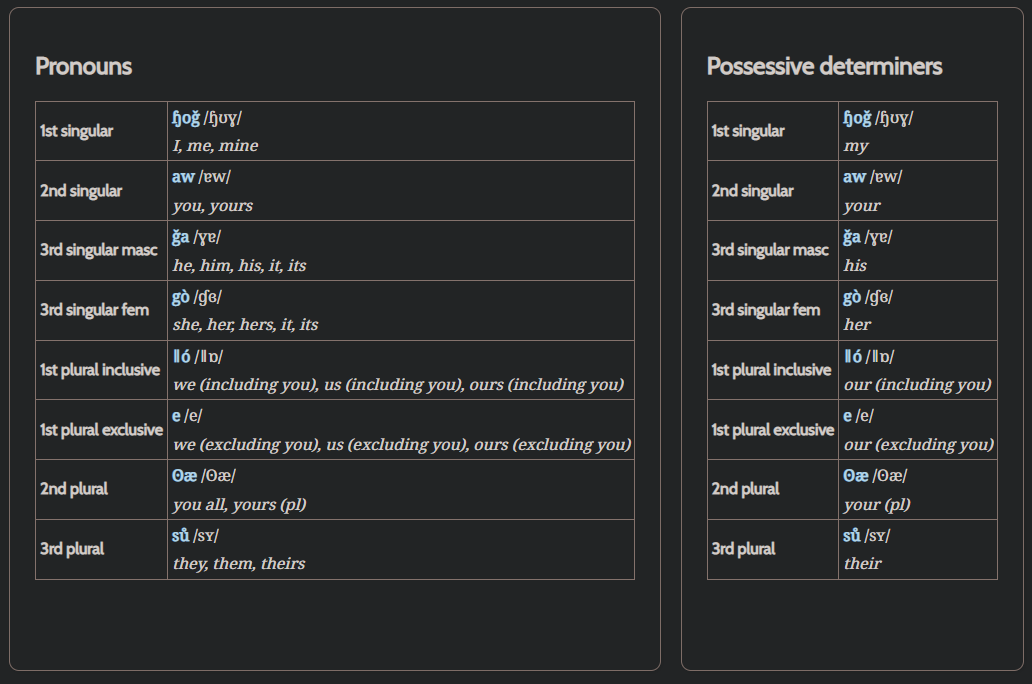Sèwsi (sɤwˈsə)
Phonology
Consonant inventory: f h s t w ç ǁ ǂ ɠ ɣ ɥ ɧ ɮ ɸ ʎ ʐ ʑ ʘ ʜ ʣ ʨ β θ
Co-articulated phonemes
Vowel inventory: e æ ø œ ɐ ɒ ə ɛ ɞ ɤ ɨ ɯ ɶ ʉ ʊ ʏ
| ↓Manner/Place→ | Bilabial | Labiodental | Dental | Alveolar | Retroflex | Alveolo-palatal | Palatal | Velar | Pharyngeal | Glottal |
| Stop | t | |||||||||
| Implosive | ɠ | |||||||||
| Affricate | ʣ | ʨ | ||||||||
| Fricative | ɸ β | f | θ | s | ʐ | ʑ | ç | ɣ | h | |
| Trill | H | |||||||||
| Lateral fricative | ɮ | |||||||||
| Lateral approximant | ʎ | |||||||||
| Click | ʘ | ǂ | ||||||||
| Lateral click | ll |
| ↓Manner/Place→ | Labial-palatal | Labial-velar | Sj-sound |
| Fricative | ɧ | ||
| Approximant | ɥ | w |
| Front | Central | Back | |
| High | ɨ ʉ | ɯ | |
| Near-High | Y | ʊ | |
| High-Mid | e ø | ɤ | |
| Mid | ə | ||
| Low-Mid | ɛ œ | ɞ | |
| Near-Low | æ | ɐ | |
| Low | ɶ | ɒ |
Morphology
Main word order: Subject Verb Object (Prepositional phrase). “Mary opened the door with a key” turns into Mary opened the door with a key.
Adjective order: Adjectives are positioned before the noun.
Adposition: prepositions
Nouns
| Singular |
|
| Plural |
|
| Definite |
|
| Indefinite |
|
- Used to talk about countable nouns in general: English’s ‘I like cats’ would translate to ‘I like the cats’
- Not used for non-specific countable nouns: non-specific means ‘I am looking for an (any) girl in a red dress’, whereas specific means ‘I am looking for a (particular) girl in a red dress'.
- Not used for non-specific mass (uncountable) nouns: non-specific means ‘Would you like some (any) tea?’ whereas specific means ‘Some tea (a specific amount) fell off the truck’
Verbs
| Present | Past | Future | |
| 1st Person |
|
|
|
|
|
|
|
| 3rd Person |
|
|
|
| Imperfective |
|
Derivational morphology
- Adjective → adverb = If starts with a vowel: Prefix ɮ-
- Else: Prefix ɮə-
- Adjective → noun (the quality of being [adj]) = Prefix ɸœ-
- Adjective → verb (to make something [adj]) = Prefix ə-
- Noun → adjective (having the quality of [noun]) = If starts with vowel: Prefix ʜ-
- Else: Prefix ʜʉ-
- Noun → adjective relating to a noun (e.g. economy → economic) = Prefix sœ-
- Noun to verb = If starts with a vowel: Prefix ǁ-
- Else: Prefix ǁɐ-
- Verb → adjective (the result of doing [verb]) = If starts with a vowel: Prefix ɮ-
- Else: Prefix ɮə-
- Tending to = Prefix ɠʉ-
- Verb → noun (the act of [verb]) = If starts with vowel: Prefix ʘ-
- Else: Prefix ʘɐ-
- Verb → noun that verb produces (e.g. know → knowledge) = If starts with a vowel: Prefix ɥ-
- Else: Prefix ɥe-
- One who [verb]s (e.g. paint → painter) = If starts with vowel: Prefix β-
- Else: Prefix βɨ-
- Place of (e.g. wine → winery) = If starts with vowel: Prefix s-
- Else: Prefix sɨ-
- Diminutive = Prefix ɮʊ-
- Augmentative = If starts with vowel: Prefix t-
- Else: Prefix tɶ-
Syllable structure: (C)V(C)
Stress pattern: Ultimate — stress is on the last syllable
Spelling rules:
Numbers
Sèwsi has a base-20 number system:
Spelling rules:
| Pronunciation | Spelling |
| ɐ | a |
| ʊ | o |
| ə | i |
| ɛ | é |
| ɤ | è |
| ɒ | ó |
| ɞ | ò |
| ɶ | o̊ |
| ʉ | ú |
| ɯ | ù |
| Y | ů |
| ɨ | í |
| ç | sh |
| ɠ | g |
| ɮ | zh |
| ɸ | p |
| β | v |
| ʎ | y |
| ʑ | z |
| ʐ | ẓ |
| ʣ | dz |
| ʨ | ch |
| θ | th |
| H | ȟ |
| ɣ | ǧ |
| 1 | ø |
| 2 | téth |
| 3 | ǧégú |
| 4 | ɧůʘ |
| 5 | sazh |
| 6 | ʘó |
| 7 | sæfti |
| 8 | ʘòh |
| 9 | ʘæ |
| 10 | ʘæv |
| 11 | pów |
| 12 | vèch |
| 13 | íz |
| 14 | thètfó |
| 15 | géw |
| 16 | ziɧ |
| 17 | ɥóʘ |
| 18 | gay |
| 19 | ith |
| 20 | ówæ |
| 400 | seʘ |
| 8000 | tæǁ |
Dictionary
Creative Sources
Compiled list of (free) sites, tools, and links I use for various assets or art in SEVEN SEALS- Article, World, & Icons made with Bannersnack (FREE)
- Character Portraits & Landscapes made with ArtBreeder (FREE)
- External Family Tree Tool is FamilyEcho (FREE)
- Unique Symbols & Signs from Cool Symbols (FREE)
- Various Fantasy Names generated from Fantasy Name Generator (FREE)
- Sci-Fi inspired names & Generators via Donjon (FREE)
- Flags & Shields made with Armonia (FREE)





